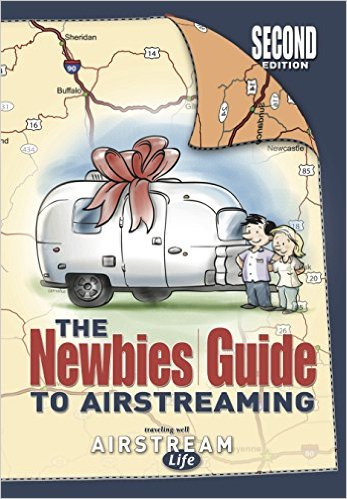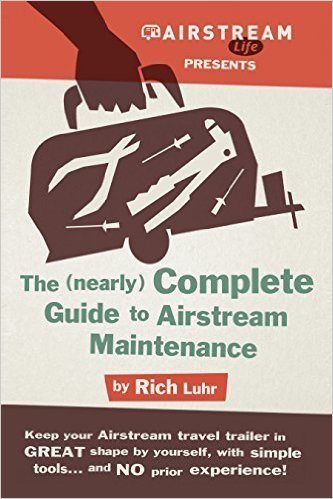The saying, “All mistakes are lessons in disguise.”, does seem like a great perspective to take on learning from life’s experiences. However, when you’re on a freeway towing a ten thousand pound trailer and a sign tells you that you cannot continue into the tunnel ahead and you end up exiting into a bad part of Baltimore, you’d rather smack yourself on the forehead and vow never to be so unprepared again. But the “lessons” keep coming and for as much preparing as one can do, you only know what you know and sometimes those little hidden gems of know-how are buried too deep in the forums and you end up on narrow streets wondering how in the hell are you are going to get out of this one.
Lesson numero uno - there are countless more of these lessons out there and our preparation now comes more in the form of attitude and mutual humor about all unknown obstacles heading our way.
However, we have learned A LOT in the four months we’ve been on the road and if you’re reading this and are planning on striking out on a similar adventure, we’ll save you the forehead smack.
- Research the route.
Yes, this one is directly related to the intro and it is perhaps the most important lesson we’ve learned so far. Even though we had thoroughly researched the route to get around New York, we did not expect another restricted road farther south in Baltimore. Never even saw it coming. Now, before we hit the road for any amount of distance between campsites, we research the roads we are taking to ensure that we don’t end up in another sketchy situation. Too many times Google has diverted us into town centers (fairly certain they are paid to put drivers in front of businesses!), where roads are narrow and corners are tight. So, we make sure we know which highways we’re taking in advance and even if it takes more time, it’s better than being stuck. There are a host of sites that are helpful in researching which roads are the best to take for any route, including www.rvforum.net, www.rvtripwizard.com, and rv-roadtrips.thefuntimesguide.com. If you like paper, we’ve read that the Rand McNally Motor Carrier’s Atlas is helpful too. There are also some good GPS apps and devices that will warn you of a issue with any given route. Especially on the East coast, there are numerous restricted roads, tunnels, and overpasses. Some of the Parkways don’t let RV’s drive them at all, certain tunnels don’t allow propane tanks, and many overpasses are too low for taller rigs. Researching your route will save you from questionable detours, driver vs. navigator battles, and a lot of unnecessary stress.
- Determine drive time limit.
This lesson is strictly personal and will vary by traveler. In the beginning, our plan was to ‘take it slow’ and shorten our drive days to 4-5 hours per day with more stops between destinations. After two solid weeks of this when pushing from Yellowstone to Maine, we decided that this was not our ideal method. Instead we increased our drive times to 6-8 hours with less stops, but more time at the stops we did make. That way we aren’t doing drive days back-to-back.
- It is HARD to find a good RV park.
Even the most expensive, luxurious RV park is no match for the beauty and solitude of the State/National Parks. This is another personal preference, but the difference is feeling like you live in a trailer park or like you live in your own personal wooded haven. There are a handful of RV resorts and campgrounds that do a good job of creating a secluded feeling and we’ve found that Thousand Trails campgrounds are your best bet for a full hook-up camping experience without the RV sales lot feeling.
- Be prepared to give all of your money to your cell phone company for data.
Unless of course you have a grandfathered unlimited plan and unfortunately, even those are beginning to get throttled and cancelled. Our biggest fixed cost is our cell phone bill, entirely for the data plan.
- In humid places, nothing dries.
After about 2 uses our towels smell like they were dipped in rotten milk and we go through them like the paper variety. Washing them in vinegar will help for a little while, but not forever. Also, hang-dry laundry will take about double the time to dry as well, unless you can hang them outside. But then you’re risking a display of your unmentionables to your neighbor.
- Almost level is a thing.
At first, we were committed to being the most level as possible with the little green bubble exactly between those two lines. Then we set-up in the dark, then we set-up without enough levelers, then we set-up in brand new loose gravel, then we just said fuck it. Currently, that little bubble is resting on the inside of one of those lines and we’re cool with that. If the bathroom door isn't swinging shut on its own, we're good.
The supplies that saved us.
BODY WIPES
Yep, they’re a thing. They’re called shower wipes or body wipes, and they’re genius for those dry camping sites or partial hook-ups. Plus, we’re basically full-time campers now, so who needs a real shower every day? We ordered every option available on Amazon to find our favorite and here are our notes on each in order of our preference.
- Power Shower - Our favorite. They are large, thick, and smell good without being overpowering.
- Go After Sports Wipes - Second favorite. A little thinner than Power Shower, but still effective and leave you feeling semi-clean after use.
- No Rinse Bathing Wipes - These are HUGE and super thick, but aren’t moist enough to be as effective even with the great material.
- Goodwipes - Are basically a little larger version of a wet wipe, kind of thin and flimsy, but still smell good. Because they are individually wrapped, they’re good for one-the-go.
- Showerpill - A lesser version of Goodwipes.
- Action Wipes (not pictured) - Because they don’t work and leave you smelling worse than before you used them. We've unscientifically determined that they actually activate the bacteria on your body, rather than removing it. Try 'em out if you like yourself a funky adventure.
SPACE HEATER
We can’t take credit for this one, as it was our good friends, Story is our Way Home, who turned us onto this must-have. When we’re fully hooked up in cooler places, that little space heater goes a long way in heating our tiny home and saving us a ton in propane.
DE-HUMIDIFIER
Even though we’re not entirely sure it’s doing anything, the container full of water every day makes us feel better about this purchase. Also, if it’s helping our mental state in Florida, it’s worth every penny.
The practical RV stuff or as Shaun calls it, the manly stuff.
A TON OF EXTRA FUSES
We’re in constant need of extra fuses due to a faulty lift, so you may not need them as much as we do, but they’re still great to have on hand just in case. One blown fuse and you might be SOL.
WATER PRESSURE REGULATOR
There are certain items you will discover you need the more you travel and experience different campgrounds. Some campgrounds have high water pressure and actually require you to have a pressure regulator to ensure no leaks. There are fancy options that have a gauge and then the standard metal option with no frills. We went with the latter and it has worked just fine. Word to the wise, a $2 regulator can save you about $200 when you don't have to replace your water pump due to a broken check-valve.
50 TO 30 AMP ADAPTER
If you’re on 30 amp and a campground only has 50 amp power, you will need an adaptor and the campground will require you to have one. We only experienced this once and the campground store sold them, but you can probably find one cheaper on Amazon or at Camping World.
Because some campsites put your sewer, water, and power so far from your trailer pad.
1. Power Cord Extension.
2. Extra long sewer hose
3. Extra water hose
For you fellow Airstreamers out there, these books have a ton of good information. Also, we bought every single one of the suggested supplies and have needed each at some point.





